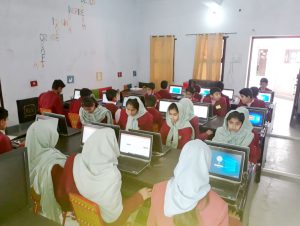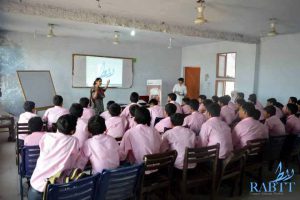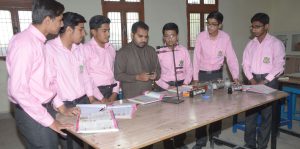Commitment to Excellence
One of the main reasons behind Pakistan’s dysfunctional social and economic state is the inability of its education system to produce innovative, intellectual, and critical thinkers. Our education system focuses on teaching students how things are done, ignoring the “how” and “why” aspect of it. From a young age students are forced to accept things in a certain way. They are discouraged to challenge methodologies or approach things differently. As a result of this, students are transformed into employees who are part of the status who are only good enough to operate machines.
Students choose careers based on the potential salary, ignoring the element of their own interests. Frustrated, they grow into disgruntled employees who live in the hope of significant growth that never surfaces. The problem gets multiplied across generations and the country fails to actualize the full potential of its human resources.
 In light of this problem, it is the responsibility of the education system to generate interest within a child for a respective field from a very young age. It is integral to develop romanticism towards a specific field within every child. This would guarantee that every student would consider his/her occupation as a hobby and strive towards discovering every aspect of their field of interest. This would allow them to live a more satisfied and content life, doing what he/she loves. On a National level, this would propel the country towards new heights of innovation and social/economic development.
In light of this problem, it is the responsibility of the education system to generate interest within a child for a respective field from a very young age. It is integral to develop romanticism towards a specific field within every child. This would guarantee that every student would consider his/her occupation as a hobby and strive towards discovering every aspect of their field of interest. This would allow them to live a more satisfied and content life, doing what he/she loves. On a National level, this would propel the country towards new heights of innovation and social/economic development.
SCIENCE ENRICHMENT PROGRAM
The lack of science learning can be broken down into two key components,
- Lack of practical general science education at the primary level and
- Lack of practical specialized science education at the secondary level.
At the primary level, our teachers developed an internal science model development program in which they use junk materials to construct specific science models with students. They constructed 3-D models of respiratory, digestive, and nervous systems using household materials such as drainage pipes, cotton, balloons, clothes, and perfume bottles. Our teachers noted that the construction of these models enhanced the conceptual understanding of course materials, as they generated a higher level of interest from the students. Such innovation is a testament to the dedication of our teachers, in taking independent initiatives to enhance the actual learning process.

At the secondary level, we developed basic Chemistry, Physics, and Biology laboratories at our main branch in Kot Ishaq. The labs were internally financed and were developed to provide practical education in the subject. With the introduction of science labs, the aggregate science marks of our 10th grade students (in their matric exam) rose considerably. This exemplifies the significance of a practical education.
In early 2013, the Ali Institute of Education organized a Science model development Contest at the AIE Lahore. The students from our foundation were competing against other contestants from well reputed institutes such as Punjab University and Lahore School of Economics. By a unanimous decision, the models made by our students received the first place in the competition.
In the words of Mr Shahid Majeed, Rektor Ali Institute of Education: “The reason for M.H.SUFI FOUNDATION’S 1st position in the competition was that all their models were made entirely from common household and junk materials”. No other institution was able to demonstrate such innovation and creativity.
The Foundation plans to extend its Science Enrichment Program by further identifying and implementing initiatives that can enhance the scope of Science Learning
ENGLISH READING PROGRAM
Reading English is an important part of language learning because it helps you develop other related skills like grammar, vocabulary, and writing. Reading allows language learners to explore topics that they love and stories that engage them. Humans are complex beings. They have different facet to our existence: they have careers, partners and friends as well as distant acquaintances. They also differ regarding language, culture and belief. But in general, they desire certain things like acceptance and connection, and if one start to read more widely, his ability to make connections and meaningful contacts with people will improve: he will feel more confident when while try to speak English. Reading opens up so many doors for communication and contact. The more you read the more things you know. It is 100% accurate.
 Our analysis of the problem revealed three major problems:
Our analysis of the problem revealed three major problems:
Firstly, the parents of most students have a very limited command of the English language and therefore their children are not exposed to spoken English at home.
Secondly, while we did have three to five periods of English reading in the junior classes, most children were not getting sufficient attention from the teacher. This was owed to the fact that most classes have about thirty students and the English reading period is only thirty five minutes long.
Thirdly, because outside the classroom, most children do not normally talk to each other in English; therefore many of them were afraid of speaking in English in public for fear that their pronunciation was incorrect and that they would be mocked.
Accordingly, we decided to develop and implement the English Reading and Writing Program to the effect of betting the English reading and writing skills of our students.
School has started a reading program for PJ, PS, I and II. For this program, well equipped language labs are established in all branches. Each lab is outfitted with LED and reading videos for each grade level. Research and development department search and select videos according to content of all specified grade levels. This searched and selected reading videos are provided term wise to run the reading program smoothly.
Teacher conduct reading periods in their supervision and these reading activities are followed by a well prepared discussion and feedback session. This program proves itself an enormous landmark in a child’s reading ability. We have found that the children love the reading period. Teachers tell us that it is by far the favorite period for most children. We have been able to achieve great results from the Reading Program. We expect the results to improve as students pass onto senior classes.
The program is another example of the Foundation’s innovative approach towards education.
MONITORING AND EVALUATION
M.H. Sufi Foundation’s academic performance is monitored through the functionality of the Planning department and Four (4) internal academic Departments.
PLANNING DEPARTMENT:
This department is designed to maintain the quality of education in a
ll branches to enhance the performance and training level of Head Teachers, Teachers and Students by researching implimenting and monitering academic strategies, assesment strategies in all school branches.
RESEARCH AND DEVELOPMENT DEPARTMENT:
Our In house R and D Cell focuses on the optimization of Curriculum

implementation, teaching methodologies, and the development of Standard Learning Objectives subject wise/ class wise. The goal is to develop methods that maximize activity based teaching and improve actual learning outcomes rather than just rote learning The Cell is also responsible for the In- House training of our teachers as per the developed curriculum.
EXAMINATION DEPARTMENT:
Our In House Examination Cell prepares assessments that encourage practical activity based teaching and conducts assessments in a fair environment. The Cell prepares term wise reports of the assessments which are then shared with the Senior Management of the schools.

INSPECTION DEPARTMENT:
Our In house Inspection Department is responsible for visiting all schools every term to qualitatively observe the academic and administrative performance of the schools. The prepared reports are shared with the Senior Management of the schools on a term wise basis.
HUMAN RESOURCE DEPARTMENT:
The HR Department is tasked with conducting appraisals of teachers, principals, and all other academic and administrative staff on a term wise and annual basis. This forms the backbone of the monitoring system holding everyone accountable for their performance. All of this is in addition to all the typical tasks performed by an HR Department such as hiring, conduct assesments, talent searching and manuals etc.
FINANCIAL AID / SCHOLARSHIPS
M.H. Sufi Foundation provides scholarships on need basis to the deserving students as per following criteria.
SCHOLARSHIP QUOTA:
Scholarship application are reviews every year and scholarships are given to deserving students every year after a thorough review.
All the information provided by the parents in scholarship form is deeply assessed and reviewed. Currently the foundation is awarding scholarships to 2500 students which is 30% of its students population.
FEE CONCESSION POLICY:
Similarly fee concession are given to student/families as per following policy:
Sibling’s concession:
Students excluding first one will be allowed a fee concession at school level and at intermediate level per month where two or more real brothers and sisters are studying in any branch of M.H Sufi Foundation Schools.
Employees Children:
General staff member’s children are allowed 50% concession in fee whereas support staff member’s children can enroll their children up to 75% concession at any branch of M.H. Sufi foundation Schools.


